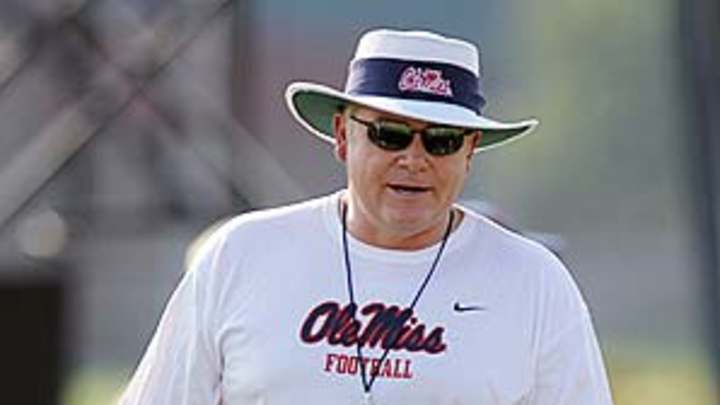New SEC ban means oversigning is nearing its end nationwide


DESTIN, Fla. -- For all intents and purposes, oversigning in big-time college football is over. On Friday, the SEC, home to seven schools that signed more than 25 players this past February, passed a rule limiting its member schools to a maximum of 28 signees a year.
Embarrassed by the negative attention the league received after Ole Miss signed 37 players in February, SEC presidents voted unanimously Friday to cap the number of signees beginning with the next signing class and to forward legislation to the NCAA that could result in a nationwide cap. Only the Big Ten currently has a similar rule on the books. The NCAA allows each school to admit only 25 new scholarship football players each academic year, but it has no rule limiting how many players can sign. After 37 letters-of-intent rolled in on national signing day, Ole Miss coach Houston Nutt cracked, "...there's no rule that says we can't sign 80."
Now there is, and if the conference that is home to the highest percentage of oversigners bans the practice, it's a safe bet that presidents of schools in other leagues will follow suit. "The presidents and chancellors view the letter-of-intent as a commitment to the institution from a student-athlete that is academically capable of being admitted and contributing athletically," SEC commissioner Mike Slive said.
Some coaches feel otherwise. Nutt, with his second signing class at Ole Miss, took several players he knew wouldn't qualify with the intent of placing those players at Mississippi-based junior colleges. By steering talented players to the nearby JUCOs, Nutt hoped to forge a strong relationship with the coaches at those schools so that those coaches would in turn steer their talented graduates toward Ole Miss.
"Here's the thing about the 37," Nutt said Tuesday. "Everybody throws that number out, but I wanted to really make sure that we have a good relationship with Mississippi. We knew that seven to eight of those guys 100 percent would not qualify, so you're able to help some junior colleges."
It's that "100 percent not qualify" part that irked the presidents. They would prefer coaches recruit only players capable of meeting the NCAA's relatively low minimum academic standards. "From their point of view," Slive said, "there aren't other reasons to sign kids."
There are a few, but the argument is a tough one to make to a university president. Troy coach Larry Blakeney, the Stephen Hawking of oversigning physics, believes he gives players a chance who may otherwise given up on the idea of higher education. Between 2005 and 2009, Blakeney signed an average of 32.4 players a year. Despite signing 40 this past February, Blakeney said that he never has failed to provide a scholarship for an academically qualified player. "If you ever balk on one, you won't have many more opportunities," Blakeney told SI.com in February. "We've never fallen short. We've never not had a scholarship."
Thirty Football Bowl Subdivision schools signed more than 25 this year, but only nine would have run afoul of the rule as proposed by the SEC. Three (Arkansas, Ole Miss and South Carolina) are SEC members. Army, which gives all its students full academic scholarships, signed 33 but wouldn't be subject to the rule because its signees did not accept football scholarships. In the past two seasons, only Ole Miss and Troy have signed more than 28 in consecutive years.
A national rule would hurt schools in Mississippi and Kansas, which can benefit from oversigning because of the symbiotic relationships with in-state junior colleges. The rule would aid schools such as Duke, Notre Dame, Stanford, Vanderbilt and academically elite public schools that cannot oversign because any player who could earn admission to their schools would almost certainly meet the minimum NCAA requirements.
Those schools might have earned the biggest victory Friday. Of course, in this era of cost-containment, several other schools may have gained a small benefit. The office managers in the athletic departments at Kansas State, Ole Miss, Troy and the other serial oversigners won't need to order so much paper and toner. Come February, their fax machines may not be so overworked.
